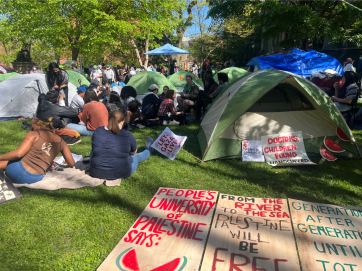Freedom of speech often has a dicey, precarious existence on contemporary college campuses, where it’s more likely to be grudgingly tolerated than promoted or celebrated. And the time is long, long gone when senior administrators, especially presidents, were outspoken defenders of free speech as an integral and indispensable ingredient in the academic enterprise of open and unfettered inquiry. That could be a bumpy ride, of course, since some people were bound to collide with ideas that affronted or – heaven forbid – offended them. But you could count on professors and presidents alike to stick to their guns: instead of taking offense, why not make use of free speech yourself and formulate a counter-argument? We’ll just as readily go to the mat on your behalf.
But it hasn’t been that way for a very long time. Instead, as we’ve often reported at this page, freedom of speech and traditional academic freedom are relentlessly embattled on many campuses at the hands of senior administrators, who nowadays take the lead in devising mischievously vague codes prescribing “civility,” regulating sexual misconduct or ferreting out ubiquitous “hate crimes.” These policies can make it very difficult to discuss or debate an ever-widening range of topics and can carry punitive consequences for those who aren’t careful. Beware of same sex marriage or race relations in particular, although there’s lots more that can get you into big trouble.
Therefore, how refreshing, uplifting, positively inspiring it was to read this ringing defense of free speech and academic freedom by Amherst College’s president, Carolyn A. Martin. It seems that some alums were more than angered by long-time Amherst professor Hadley Arkes, an outspoken opponent of same-sex marriage who regularly publishes journalistic explications of his views on that subject. The incensed alums demanded that Amherst dissociate itself from Arkes’s off-campus pronouncements and further insisted that he should not be permitted to cite his institutional affiliation with the college, which had a responsibility to protect its students from his poisonous influence.
President Martin, although no doubt on the same page as Arkes’s critics, stood firmly and eloquently on the side of his right of free expression:
In times of ongoing debate, it is essential that colleges and universities protect the free exchange of different perspectives, while taking every reasonable measure to protect their communities from discrimination and disrespect…. The distinctive responsibility of colleges and universities is to protect freedom of expression so that the force of argument can help us resolve our hardest problems. The more contentious the issue, the greater the responsibility. As we undertake the exacting work of maintaining an environment on campuses in which freedom and respect are maintained, institutions will need to stand up to pressure from all sides, protecting the hard-won principles of free speech and non-discrimination and sorting out the complicated issues that arise in specific cases. These are the commitments that sustain our ability to foster critical dialogue in society.
Well done, President Martin, that says it all. I hope your colleagues on other campuses will take heed.













